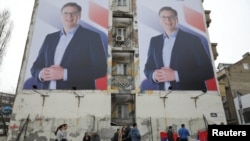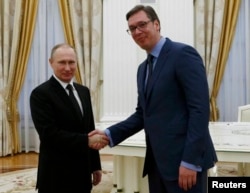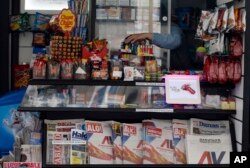Some 6.7 million voters in Serbia are poised to cast ballots Sunday in what could be one of the most irregular presidential elections in the central Balkan nation's history.
Viewed by many as a test of Prime Minister Aleksandar Vucic's popularity, the election will see the former firebrand ultranationalist-turned-EU supporter face off against 10 candidates representing a range of parties that make up the nation's fragmented opposition.
However, only three or four of these 10 candidates can expect to win 10 percent or more of the votes, according to current polls. Vucic's support hovers around 50 percent, and if he can win more than half the vote Sunday, he would avoid a runoff election next month, in which the opposition could coalesce behind a single candidate.
His critics warn that Vucic is looking to replicate the kind of autocracy seen in Russia under Vladimir Putin, who has already endorsed the incumbent. Vucic's challengers have accused him of mudslinging, controlling the media and intimidating voters ahead of the election.
Vucic, a former information minister and hard-line propagandist under President Slobodan Milosevic, rejects those accusations. On Thursday, his ruling Serbian Progressive Party (SNS) purchased the front pages on almost every daily newspaper to advertise the candidate's red-and-blue AV logo-emblazoned poster.
While many Belgrade pundits seem to agree that a Vucic triumph Sunday is almost a foregone conclusion — political columnists differ only on the percentage points by which he'll exceed the 50 percent threshold required for victory — many voters continue to question campaign-trail events that indicate a heavily rigged election.
"I think that these are the most irregular elections when it comes to election campaign," said Cvijetin Milivojevic, a media analyst with Agency Pragma, a Belgrade public relations and communications group. "We shall see what will be the situation regarding vote counting."
Rasa Nedeljkov of the Center for Transparency, Research and Accountability (CRTA) in Belgrade, says only six observers of the Organization for Security and Cooperation in Europe (OSCE) will be on hand to monitor Sunday's vote.
The entire campaign season, he said, has unfolded against a backdrop of unbridled corruption, voter intimidation, bribery and mudslinging.
"I can assure you that when there is no control, when there is no awareness that the prosecutor's office would react to corruption ... when voters experience threats and influence from their superiors to vote for a certain candidate, pressuring them to go out on political gatherings — when I know that no one would control me or arrest me for that — then [as a candidate] I would do anything," he told VOA's Serbian service.
"The situation tells us that conditions for having democratic elections are down to minimum," he added. "If there is no systemic control, then we can assume that different participants will try to do different things that will compromise the quality of the election process."
Worse than Milosevic era?
This campaign is likely to be remembered for an unequal media representation of the presidential candidates. According to one Belgrade media watchdog NGO, Vucic garnered 56 percent of televised coverage by the formerly state-run RTS, Serbia's only public radio and television broadcaster. The 10 other challenger candidates split the remaining 44 percent of broadcast coverage.
In the cases of commercial media, percentages weighed overwhelmingly in Vucic's favor.
"Overall, we have five opposition candidates that were disqualified on all grounds. Sadly, the vast majority of Serbian voters believe in what they see on RTS or Pink television," said Milivojevic, referring to an international Balkans tabloid media conglomerate that is owned by a Serbian tycoon who is publicly supportive of and personally close to Vucic.
"According to the program on those television stations, opposition candidates are not qualified to be mentioned at all or even be presented as serious opponents," Milivojevic said. "That sort of disqualification was not seen even during Milosevic's era, or not in that measure."
Nedeljkov told VOA that Serbia's Regulatory Authority of Electronic Media (REM) recently announced it would not monitor television broadcasts during the campaign.
Serbia's Anti-Corruption Agency, he added, has announced that it will not fully monitor Sunday's vote.
"The only hope for these misfortunate opposition candidates is the distant chance of having the second round, because they are not aiming to win," Nedeljkov said. "I think of those true opposition candidates, and if there would be a second round, that they will be the ones to enter it. It is deranged situation, really, because opposition candidates are competing among themselves to win the second round, if we'll have one."
Vucic received a head start from his powerful Serbian Progressive Party, as well as its coalition allies.
No other candidate enjoys such strong support from the leading Serbian parties, and some of the candidates don't even have a political party behind them.
Serbia has been an independent republic since 2006, following the breakup of Yugoslavia. Serbia became a candidate to join the European Union in 2012 and has been negotiating its accession to the bloc since 2014.
This report was produced in collaboration with VOA's Serbian service. Some material was provided by AP and Reuters.


